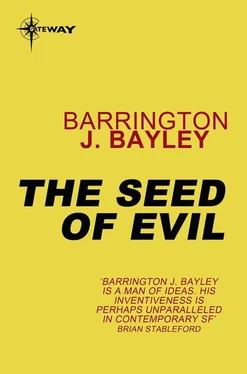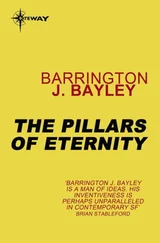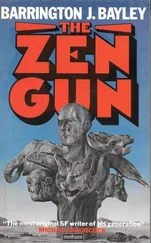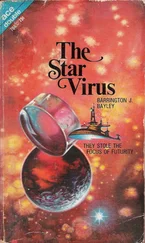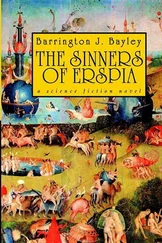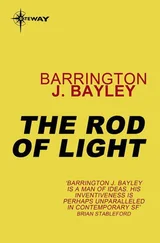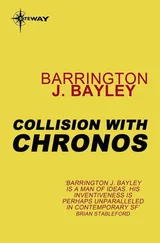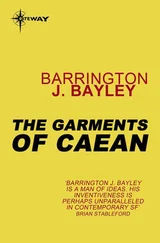Barrington Bayley - The Seed of Evil
Здесь есть возможность читать онлайн «Barrington Bayley - The Seed of Evil» весь текст электронной книги совершенно бесплатно (целиком полную версию без сокращений). В некоторых случаях можно слушать аудио, скачать через торрент в формате fb2 и присутствует краткое содержание. Город: London, Год выпуска: 2012, ISBN: 2012, Издательство: Gateway, Жанр: Фантастика и фэнтези, на английском языке. Описание произведения, (предисловие) а так же отзывы посетителей доступны на портале библиотеки ЛибКат.
- Название:The Seed of Evil
- Автор:
- Издательство:Gateway
- Жанр:
- Год:2012
- Город:London
- ISBN:978-0-575-10220-0
- Рейтинг книги:4 / 5. Голосов: 1
-
Избранное:Добавить в избранное
- Отзывы:
-
Ваша оценка:
- 80
- 1
- 2
- 3
- 4
- 5
The Seed of Evil: краткое содержание, описание и аннотация
Предлагаем к чтению аннотацию, описание, краткое содержание или предисловие (зависит от того, что написал сам автор книги «The Seed of Evil»). Если вы не нашли необходимую информацию о книге — напишите в комментариях, мы постараемся отыскать её.
, here is a second collection of endlessly inventive stories by Barrington J. Bayley; dark fables resounding with sombre undertones—love used as a weapon, God assassinated by the ingenuity of man, the secret of death revealed, the inexplicable explained! Tales which will be pondered on, and remembered.
The Seed of Evil — читать онлайн бесплатно полную книгу (весь текст) целиком
Ниже представлен текст книги, разбитый по страницам. Система сохранения места последней прочитанной страницы, позволяет с удобством читать онлайн бесплатно книгу «The Seed of Evil», без необходимости каждый раз заново искать на чём Вы остановились. Поставьте закладку, и сможете в любой момент перейти на страницу, на которой закончили чтение.
Интервал:
Закладка:
That was not the end of the matter: there were still some who were prepared to take plane for England in the knowledge that once airborne they would not be let back into East Africa again. These stateless suppliants, capitalising perhaps on the reputed humanitarianism of their prospective hosts, or else desperate enough to try anything, were shuttled back and forth between airports for weeks. Finally, with much grumbling and misgiving, the officials would relent.
Such a course of action was chosen by my parents. They embarked upon it cheerfully enough; others had been successful, and so, they thought, could they. Besides, my mother was pregnant at the time they set out and so…?
On presenting their passports they were immediately returned to Nairobi, and thence back again to London. This occasioned them no dismay: they had expected it. Weeks, months even, might be required to pass before the portals to safety and freedom would at last open.
Yet one factor failed to enter their cogitations: how long can any government allow its decisions to be persistently overruled? Already the draughty wind of change was causing doors to slam shut all round the world. Already the word “patrial” had entered official usage as an adumbration that in future nations would look after their own and no other. Today, a third of a century later, the maxim is well established: “Procedures take precedence over persons.” My parents haplessly became the test case that was to prove this rule; the weeks did indeed lengthen into months. I was born over water, in midflight, and was not even entered on the worthless passport which by now, I believe, was stained with my mother’s tears. Gradually it became evident that they were not, ever, going to be allowed into any country again.
Sitting here gazing through the fuselage window, I often wonder how long they continued to hope. I have reason to think it was for a long time, and that when they finally lost hope was when they died. Even then my mother clung to the belief (my father knew better) that once I was alone some country would notice me, as an airborne waif, and take me in. But here I remain, the most long-suffering air passenger in history.
For a spell during my early life my situation evoked some interest and an amount of pity, a form of intercourse I find thoroughly distasteful. In my twelfth year there was an abortive attempt to resurrect Human Rights Year and I appeared (to no purpose) on TV (and was able to see the programme on the flight screens). All such public interest has long since washed away and I am left in peace. It is possible that these efforts were doubly futile, for my own image of myself differs fundamentally from the one presented by the well-meaning media; the burden of their consciousness lies on the ground—mine is up here, traversing in this airliner. Mine is the image that once formed in the mind of a pagan English king on seeing a bird, at night, enter his hall by a window; for a few moments to flit over the warmth, the companionship, the light and the feasting that took place below, before passing by a second window, never to return, into the same darkness again. This glyph of human life converted the king to Christianity.
I, let me make it clear, am no convert, for I am not the king but the bird. But does not the legend describe me precisely? Soon I shall pass into that same darkness again.
I have seen a marvellous development in passenger plane services during the time I have spent with the airline. The transports are large and spacious, with plenty of room to walk about. There are showers, bars, TV and restaurants. Businessmen speak to colleagues and transactors over the in-transit viewphone service. And of course the planes are fast, efficient and need little servicing. From my point of view this is a disadvantage, for there is only the briefest turnaround time, which allows me almost no time to spend on the ground. Previously the hours I spent between journeys on the older aircraft were like a holiday for me—fresh air has an extraordinary effect on my system. I confess I miss my youthful jaunts to the cafeteria, to the passenger lounge, or along the frontage of the airport buildings, I had, in fact, virtual freedom of access on this side of the customs barrier. But then, perhaps, I am getting too old for such exercises.
The airline has been good to me. Once when I was ill they brought me a doctor and several times I have been attended by a dentist. As I grew up pilots and stewardesses gave me new clothes to wear. For all items I am still dependent on these hand-outs, which have been my only way of accumulating property throughout life. Thus I am the possessor of adequate clothing, a toothbrush, an electric shaver, and a very small private collection of books culled over the years. These, together with my legacy (which I shall describe later) constitute my material wealth.
There is also the question of emotional wealth accruing from personal relationships. In these my life could be described as deficient. Yet I did once have a girl friend; to be truthful she was a woman rather than a girl, and was several years older than myself. We met and were drawn to one another when, in the course of her work, she had cause to travel between London and Karachi several times in quick succession (this was during the period when African routes became impassable and I was shuttled instead to Karachi or Delhi). When her intercontinental commuting ceased she took to visiting the airport and we waved to one another through the fence. Infrequently we contrived brief meetings in the passenger lounge. Then one day she failed to appear and I never saw her again. In retrospect I discard my naivety and suppose that her good will was prompted partly by pity, a thought which spoils in no small measure my memories of the occasion.
Our friendship, while it lasted, was sexually innocent; indeed there has been no occasion for sexual intercourse in my life—not that such things are impossible aboard an airliner; congress can be accomplished with a modicum of ingenuity and commonly is, in the toilets, in the changing room, even in the stewardesses’ galley. But my upbringing has given me little initiative in these matters, and I have been obliged to stifle such urges as I do feel.
Enough of these divagations—poor I may be in material and emotional wealth, but they are not everything; there is also intellectual wealth. I have an education!
For this I am indebted to my father, who before he died assiduously taught me to read and instructed me to study carefully the books in the list he drew up. I have not, it is true, finished the list. Contrary to what might be imagined, I am not a voracious reader. Debilitated by an unnatural life, I am very easily fatigued; altogether I am a weak individual, both physically and mentally. I sleep a good deal—fifteen to twenty hours a day and during the rest of the time reading is a painful effort for me. My progress is further impeded by the difficulty of obtaining the requisite books: I have to rely on chance to place most of the volumes in my hands, and have waited years, for instance, to acquire a copy of the Timaeus. This, as with several other volumes, I shall probably never see.
Many would imagine that my father, a Vedantist, would have directed me to a study of the Vedas, particularly of the Upanishads, on the grounds that in the doctrine that the world is maya , merely illusion, might be found an anodyne to mitigate my plight. Nothing could have been further from his intention. Admittedly, it has fleetingly occurred to me that that other world, the world that rolls beneath me scudded with cloud, is only an insubstantial extrapolation, an epiphenomenon, and that the only substantive things in the universe are airliners, airports, and transient passengers who flick in and out of existence on embarkation and debarkation. But that thought cannot be taken seriously. All my father’s efforts strove not to obfuscate with recondite metaphysics but to exacerbate realities and make the apprehension of my condition all the sharper. He believed in science, a product of the West; all the books he specified are by Western writers, and I take their point of view: that the world exists in reality (in so far as it is perceived between conception and death), that everything happening in it has really happened, that I really am trapped in this airliner, the only man in history never to be allowed to descend to earth.
Читать дальшеИнтервал:
Закладка:
Похожие книги на «The Seed of Evil»
Представляем Вашему вниманию похожие книги на «The Seed of Evil» списком для выбора. Мы отобрали схожую по названию и смыслу литературу в надежде предоставить читателям больше вариантов отыскать новые, интересные, ещё непрочитанные произведения.
Обсуждение, отзывы о книге «The Seed of Evil» и просто собственные мнения читателей. Оставьте ваши комментарии, напишите, что Вы думаете о произведении, его смысле или главных героях. Укажите что конкретно понравилось, а что нет, и почему Вы так считаете.
